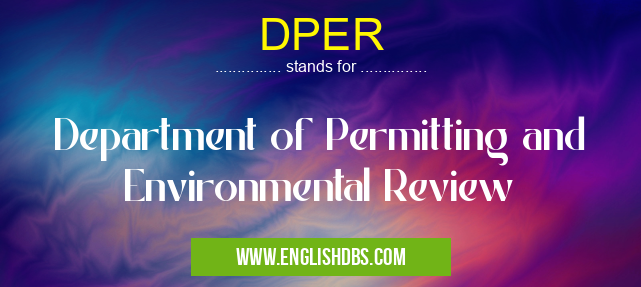What does DPER mean in ENVIRONMENTAL
DPER stands for Department of Permitting and Environmental Review, which is a governmental agency within a larger local government. This agency focuses on helping individuals who wish to obtain permits or permits relating to environmental issues, such as air quality, water quality, and noise pollution. This department is responsible for ensuring that citizens are protected from any potentially harmful environmental impacts created by their own activities or by their surroundings. Through its permitting process, the department helps individuals understand all the regulations related to certain projects before they can begin working on them. Taking into account both state and local rules and regulations, DPER works towards balancing the rights of citizens with protecting the environment.

DPER meaning in Environmental in Governmental
DPER mostly used in an acronym Environmental in Category Governmental that means Department of Permitting and Environmental Review
Shorthand: DPER,
Full Form: Department of Permitting and Environmental Review
For more information of "Department of Permitting and Environmental Review", see the section below.
Essential Questions and Answers on Department of Permitting and Environmental Review in "GOVERNMENTAL»ENVIRONMENTAL"
What is the Department of Permitting and Environmental Review?
The Department of Permitting and Environmental Review (DPER) is a government department responsible for the coordination, assessment, regulation, and enforcement of permits issued for activities related to construction and development in a given area. Specifically, DPER examines environmental impact assessments to ensure that proposed projects are compliant with applicable environmental standards and regulations.
What type of permits does the DPER issue?
The DPER issues permits for any construction projects that may potentially cause substantial environmental disturbances or harm. This includes activities related to land use planning, road building, logging operations, mining operations, large-scale infrastructure projects such as energy plants or pipelines, etc.
Where can I find information on the specific types of permits managed by DPER?
You can find information on the specific types of permits managed by DPER through their website or by inquiring directly at their local offices.
How do I apply for a permit from DPER?
To apply for a permit from the DPER, you must first obtain an application form either online or in person from your local office. Once filled out in its entirety with all necessary supporting documents attached, you must submit your application along with payment to your local office.
Who is eligible to apply for a permit from DPER?
Eligible applicants include property owners as well as representatives acting on behalf of an owner. Developers proposing large-scale projects requiring multiple permits also qualify as eligible applicants.
How long does it take for my permit application to be processed?
Processing times vary depending on several factors such as the complexity of your project and whether additional reviews are needed from other departments or agencies. Generally speaking however it usually takes around six weeks once all required documents have been submitted before you will hear back regarding approval or denial of your permit request.
Are there certain requirements I must meet before my permit request will be considered?
Yes - there are certain criteria which must be met for your permit request to be considered by the DPEE including meeting all applicable environmental standards outlined under relevant state laws as well as providing accurate maps depicting project boundaries and existing infrastructure surrounding proposed project sites.
Can I appeal if my permit request is denied by DPEE?
Yes - if your permit request has been denied you may file an appeal with DPEE within 10 days after receiving notification of denial provided you have sufficient evidence that supports why your application should be reconsidered and approved instead.
Final Words:
Overall, DPER plays an important role in ensuring the safety of both current and future generations by enforcing environmental protection laws at both the state and local levels. By taking steps such as reviewing permit applications before they are granted or monitoring compliance with laws regarding air quality, water quality, noise pollution etc., this government agency helps make sure that businesses can operate safely while still respecting nature’s limits when it comes to human activity.
